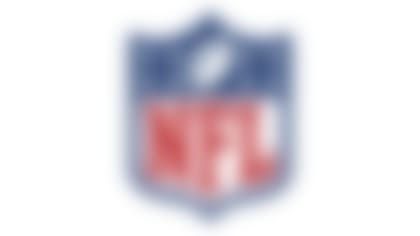NEW YORK -- The NFL Players Association proposed Thursday conducting a study of players that accurately reflects the natural level of human growth hormone in their systems.
The union has claimed its players might have a higher natural level of human growth hormone than the general population, and it also has balked at testing procedures approved by the World Anti-Doping Agency (WADA) that the league has recommended.
Instead, the NFLPA is proposing "a comprehensive HGH testing program that begins with a population study" of players to establish a test standard "that accurately reflects the population of NFL players."
"The players of the National Football League are unequivocally committed to ensuring that football is played by men who do not use performance-enhancing drugs," the union said in a statement. "The health and safety of the players, maintaining the integrity of the game, and utilization of a fair system to ensure the integrity of the game are unquestioned priorities for the players."
When the lockout ended last summer, the collective bargaining agreement included provisions for HGH testing if the union approved the process. Instead, the NFLPA has asked for more information, which it says it has not received.
Under Thursday's proposal, the union said independent scientists, medical professionals and arbitrators "will provide independent expertise at each step to ensure achieving the goals of a drug-free game and due process for the men who play the game."
The NFL was set to institute HGH testing even before the season began, but it became stalled as the NFLPA sought more data.
A league spokesman said Thursday of the union's suggestion: "The proposal is deficient in numerous respects and consistent with the NFLPA's ongoing strategy to delay testing as long as possible."
Anti-doping experts say there's no need for a separate population study for NFL players because tests performed by the World Anti-Doping Agency before the HGH test was brought to market included scores of samples from football players and others with similar body types. The ratios of those tests didn't vary significantly from those of other athletes and subsequent testing over the years has not yielded different results.
Experts also say collecting and analyzing samples from a large group of NFL players would take months.
"The fact that they're saying this now is an absolute joke," said U.S. Anti-Doping Agency CEO Travis Tygart, who has been working with both sides to get the test in place. "It seems clear now they're protecting their dirty players by further delaying the implementation of this test and not honoring the agreement they made to start this test at the beginning of the season."
NFL Commissioner Roger Goodell sent a letter last month to leaders of a congressional committee outlining the league's plans for collecting and saving blood samples of players. In the letter to California Rep. Darrell Issa and Maryland Rep. Elijah Cummings of the House Committee on Oversight and Government Control, Goodell said specimens would not be analyzed and players would not be subject to disciplinary proceedings until remaining issues about the testing regimen are resolved. Until that time, blood samples would be stored.
But no samples have been taken.
Also in October, nearly two dozen scientists and lab directors from around the world signed a letter sent to the NFL and the union stating the current test for HGH is safe, scientifically reliable and appropriate for use in professional sports leagues. That letter was sent to Goodell and union Executive Director DeMaurice Smith.
Copyright 2011 by The Associated Press











